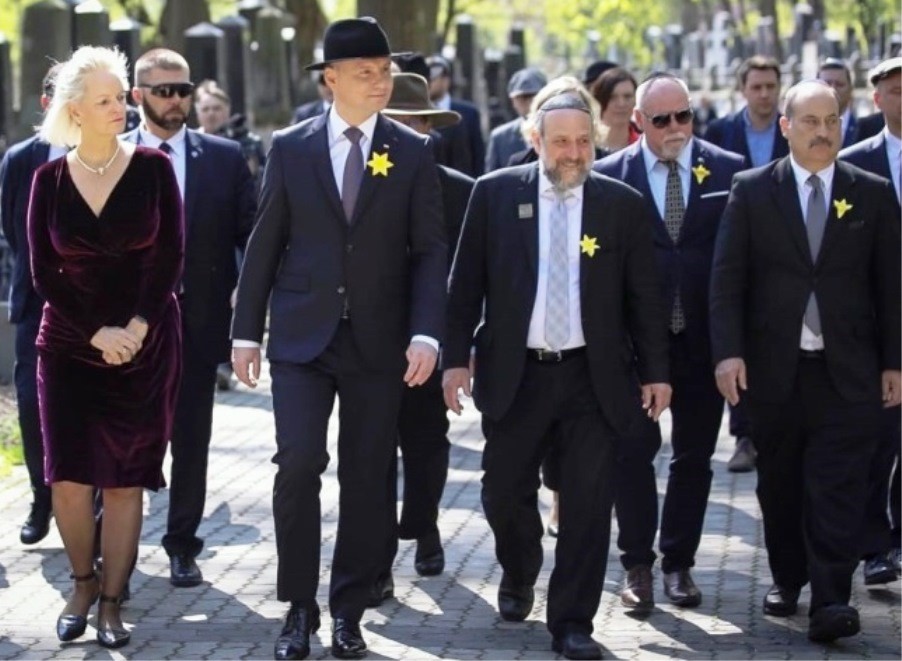click to dowload our latest edition
CLICK HERE TO SUBSCRIBE TO OUR NEWSLETTER


Published
10 months agoon
By
Mary KlukNearly 200 000 Holocaust survivors are still being supported by the Conference for Material Claims Against Germany (or Claims Conference), established just more than 70 years ago. The organisation is responsible for overseeing the process of restitution, compensation, and humanitarian support for victims of the Holocaust.
“We must ensure a measure of justice for Holocaust survivors as they enter their final years, and ensure that their lived experience serves as a lesson for generations to come,” said Claims Conference Executive Vice-President Greg Schneider, concluding his report at the recent board meeting.
As the survivors age, their needs are growing. External factors, most notably the disruptive impact of the Russia-Ukraine conflict, have posed other pressing challenges, particularly to those working in the field.
As someone much involved in Holocaust education, the work of the Claims Conference has always been something close to my heart. The South African Jewish Board of Deputies has been represented on the Claims Conference from the outset, and is responsible for communication, liaison, and administration relating to it.
I have represented our community on the Claims Conference for more than a decade. During my recent attendance at the annual board meeting in New York, I was struck once again not just by how critical the work of the organisation continues to be, but by the professionalism and unstinting dedication of those associated with it.
A critical aspect of the Claims Conference’s work is to negotiate on an annual basis with the German government on behalf of survivors what the upcoming year’s allocation will be, since the needs and circumstances of survivors are constantly changing. The outcome of this year’s negotiations were exceptionally fruitful, with the granting of a significant additional sum in direct compensation and social-welfare services for survivors.
Another positive outcome was an increase in the allocation for Holocaust education. This is indeed indicative of Germany’s commitment to ensuring that survivors are cared for as they age, and helping to secure their legacy of survival for future generations.
To assist survivors in putting in their claims, Claims Conference staff members across the globe devote countless hours to gathering the required data and sitting down with each survivor to ensure that all forms are submitted in an appropriate state to enable them to qualify for whatever reparations, pensions, or other support is due to them.
In the former Soviet Union and in Eastern Europe, where there remain many largely impoverished as well as elderly survivors, the Claims Conference largely works through social-work organisations that do a lot of the actual work on the ground. Similarly, in Israel, much of its work is done by partner organisations involved in this social workspace.
In the course of the meeting in New York, I was moved by the extraordinary eulogies given for three outstanding leaders in the field of Holocaust remembrance and restitution, namely Ben Ferencz, Ben Helfgott, and Michael Schneider. Ferencz was chief prosecutor for the 1947 Einsatzgruppen trial, which resulted in the conviction of 22 former SS commanders for the murder of more than one million Jews in Eastern Europe. The last surviving Nuremberg trials prosecutor, he was a voice for human rights and justice his entire life. Helfgott was a Holocaust survivor who went on to represent the United Kingdom at weightlifting at the 1956 and 1960 Olympics and in later life, became an inspirational speaker and human rights activist. He spoke at our Yom Hashoah commemoration in South Africa in 2011. As a South African, it was especially uplifting to hear tributes to Michael Schneider, who after being forced into exile because of his anti-apartheid activities went on to be at the forefront of efforts to assist vulnerable Jewish communities the world over, including the many needy survivors in the former Soviet Union countries.
We met many people involved in these activities. I remember in particular one on Zoom with three elderly women involved with grassroots endeavours to get food, medical supplies, and home care to survivors caught up in the Ukraine conflict. When Greg Schneider asked one of them how she found the strength and motivation to deal with the myriad stresses this work entails, she said she did it because of the quality of the people she did it for.
Simply expressed, perhaps, but it encapsulates both the ongoing moral obligation we have to ensure that our survivors are properly cared for and the passion and commitment of those who devote themselves to that task.
